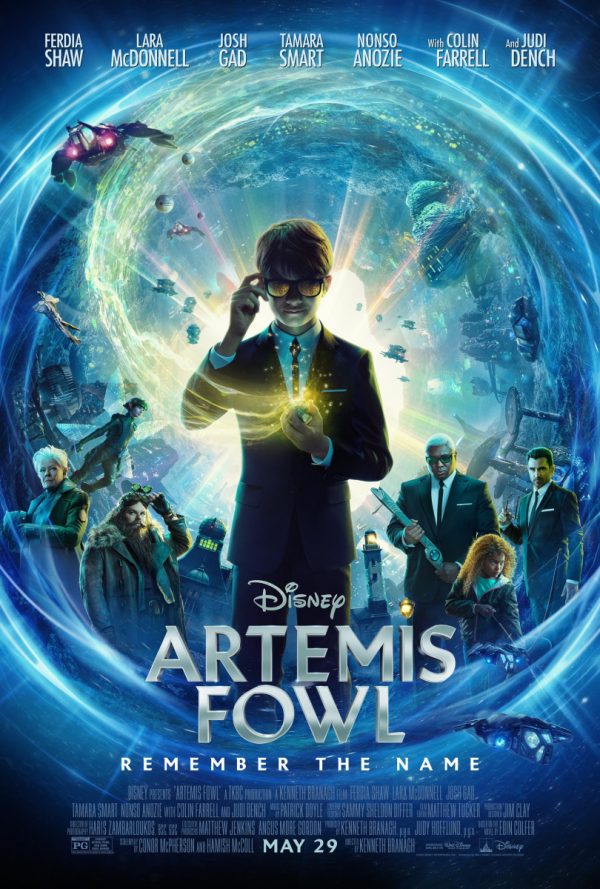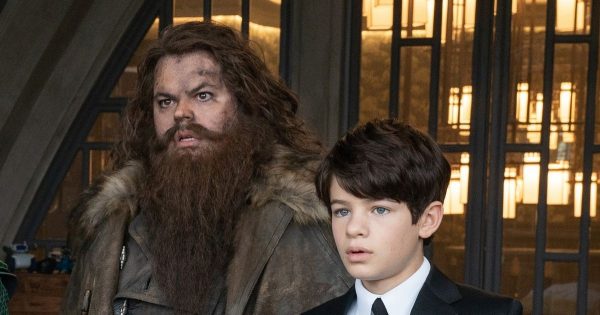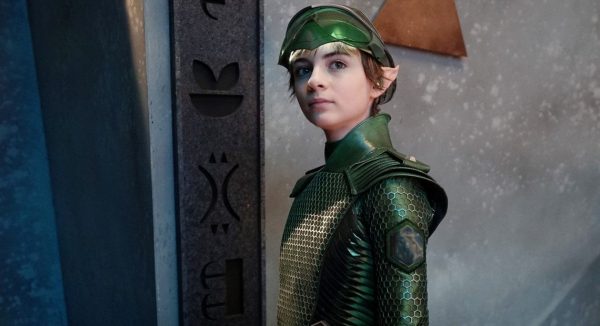Artemis Fowl, 2020.
Directed by Kenneth Branagh.
Starring Ferdia Shaw, Lara McDonnell, Josh Gad, Tamara Smart, Nonso Anozie, Colin Farrell, and Judi Dench.

SYNOPSIS:
Artemis Fowl, a young criminal prodigy, hunts down a secret society of fairies to find his missing father.

If the uncertain state of the present global film industry has led to a number of smaller mid-budget projects making an early bow on VOD services, it appears that such circumstances can also allow studios to offload their tawdry blockbuster duds with a face-saving excuse. In the very least, that seems to be the case with Artemis Fowl, which has just unceremoniously unspooled on Disney+ worldwide.
This long-mothballed big-screen adaptation of Eoin Colfer’s beloved 2001 fantasy novel has been in the works almost as long as the book has been on shelves, passing between directors (Jim Sheridan), A-list actors (Saoirse Ronan), and producers (Robert De Niro, Harvey Weinstein) for 14 years before Disney finally settled on Kenneth Branagh to helm the $125 million fantasy tentpole.
And while there aren’t any concrete reports of the film undergoing extensive re-shoots or suffering through a contentious post-production tug-of-war, it’s clear that something went spectacularly wrong with what Disney was surely hoping to be “the next Harry Potter.” With principal photography completed almost two years to the day of its long-delayed release, Artemis Fowl has been delivered to audiences with all the fanfare of an obligatory embarrassment. Colfer’s championed source work has been transformed into a stodgy, generic mish-mash of fantasy nonsense.
Artemis Fowl (Ferdia Shaw) is a 12-year-old criminal mastermind – apparently, anyway – who is forced to act following the kidnapping of his identically-monikered father (Colin Farrell). This sets him on a quest to find the Aculos, a golden, acorn-shaped Plot Device which brings him into conflict with a fleet of fairies and also Mulch Diggums (Josh Gad), a dirt-chugging dwarf.

Branagh’s film at least lets audiences know what they’re in for early on; the opening scenes are suspiciously keen to inundate viewers with relentless chit-chat, largely filmed in the most basically functional shot-reverse-shot style. Exposition is fielded out here with a tiresome urgency, though at least there’s a surprising lack of proper nouns for the audience to keep track of.
Nevertheless, Artemis Fowl’s flatly featureless script – penned by Irish playwright Conor McPherson and Hamish McColl (Paddington, Dad’s Army) – underlines a prevailing vibe of algorithmic anonymity. If director Branagh is more often a reliable craftsman than an inspired artiste, even that modest label scarcely feels fitting here; this is pure, beige filmmaking-by-committee.
If it can even hope to achieve a fraction of Harry Potter‘s success – which, obviously, it can’t – where is the necessary wonder and excitement? The film’s charmless set-pieces too often invoke the sloppy dynamism of early-2000s fantasy cinema, complete with obnoxious speed-ramping – admittedly, it’s part of plot in this case – and pointlessly unmotivated, sweeping digital camera movements.
This is a film where what passes for unique is a scene in which Gad’s character eats dirt in order to tunnel his way underground, in turn “defecating” said dirt from the ambiguous, Disney-friendly region approximating his anus. Elsewhere, what passes for restraint is a surprising refusal to contrive a romance between Artemis and elven recon officer Holly Short (Lara McDonnell), given how utterly conditioned audiences are to expect Male Lead #1 and Female Lead #1 to be paired off. It’s a small success, but one worth noting regardless.

What perhaps sinks Artemis Fowl above all other transgressions, however, is how aggressively it fails the titular character himself. Fans of the paperback franchise have already cried foul (sorry) that the big-screen version sanitises the more mischievous and unlikable aspects of his character, but even as purely presented here, he’s decidedly less interesting than at least three or four other main characters.
Given how the movie’s focus shifts around willy-nilly, Artemis often feels like a supporting character in his own movie. Though a few early scenes suggest Shaw’s got the smug moxie to make the part his own, he’s ultimately asked to take a backseat to both the large ensemble and a heap of digitally-created bombast. By film’s end, it’s clear the focus should’ve instead been trained on Holly, a far more appealing character and one performed with sure conviction by McDonnell.
The real show-stealer, however – though that term feels rather generous – is in fact Josh Gad, whose hyperactive performance as Diggums desperately tries to inject the programmatic action and drama with something approaching personality. Dropping pop-culture references left-and-right and riffing casually enough to almost convince it was improvised, there’s an appealing looseness to his work here which basically makes him feel like he’s in another movie entirely.
Given that Gad’s saddled with handling exposition-spitting voiceover narration duties and also fronting a monochrome framing device throughout the movie – one which has an unmistakable whiff of reshoots – he acquits himself better against greater adversity than anyone else in the movie.

But Artemis Fowl’s real star attractions are largely left to their own devices; Farrell spends the bulk of the movie sequestered in a single room, and even his few scenes opposite Shaw fail to elicit anything implying a convincing familial bond. Judi Dench meanwhile gets a surprising amount of screen time as elven Commander Julius Root, sporting a vaguely comical attempt at an Irish accent, though spending most of her movie tenure staring into the middle-distance in a handful of green screen sets.
And yet all things considered, there is a fringe adequacy to this film’s production, forgetting the script for a moment. It was clearly framed, lit, and shot by consummate professionals, while the production design of the Fowl house is really quite gorgeous, and for the most part the visual effects deliver exactly the fidelity you’d expect from such a high-price picture.
But powered by such a listless script as it is, the action lands with little excitement, and the big character moments similarly rouse little more than a disinterested shrug. To its minor “credit,” it at least clocks in at a svelte 95 minutes, and surprisingly ends without a post-credits tease for future attractions – perhaps because Disney knows this thing is categorically dead-on-arrival.
Technically competent yet crippled by an atrociously lazy screenplay, Artemis Fowl’s generic YA fantasy shenanigans induce unintended laughs and exasperated sighs in near-equal measure.
Flickering Myth Rating – Film: ★ ★ / Movie: ★ ★
Shaun Munro – Follow me on Twitter for more film rambling.










